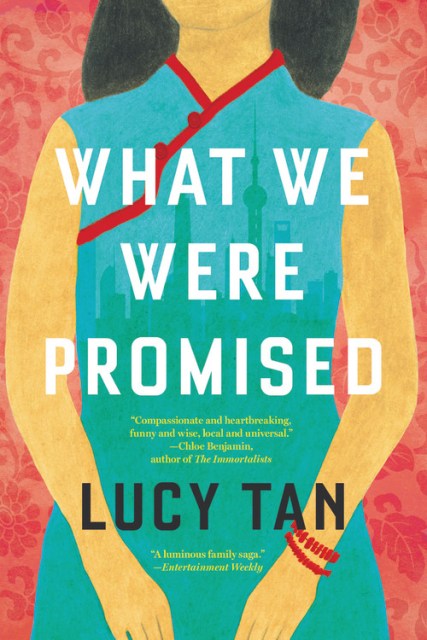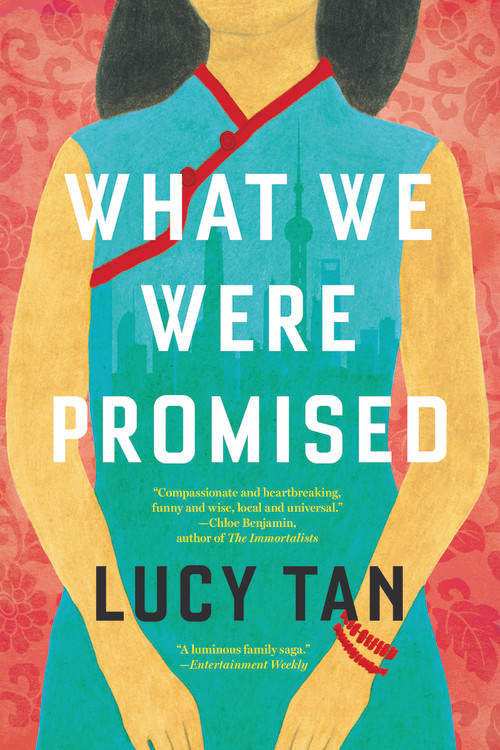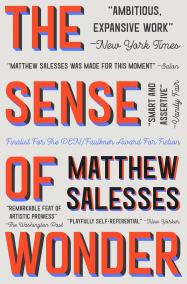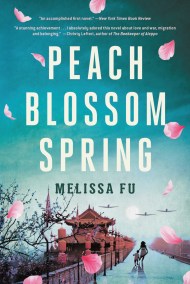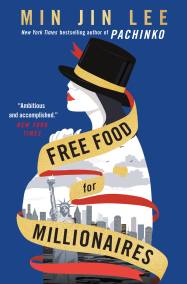Promotion
Use MOM24 for 20% off site wide + free shipping over $45
What We Were Promised
Contributors
By Lucy Tan
Formats and Prices
Price
$15.99Price
$20.99 CADFormat
Format:
- Trade Paperback $15.99 $20.99 CAD
- ebook $4.99 $4.99 CAD
- Audiobook Download (Unabridged)
This item is a preorder. Your payment method will be charged immediately, and the product is expected to ship on or around August 6, 2019. This date is subject to change due to shipping delays beyond our control.
Also available from:
Set in modern Shanghai, a debut by a Chinese-American writer about a prodigal son whose unexpected return forces his newly wealthy family to confront painful secrets and unfulfilled promises.
After years of chasing the American dream, the Zhen family has moved back to China. Settling into a luxurious serviced apartment in Shanghai, Wei, Lina, and their daughter, Karen, join an elite community of Chinese-born, Western-educated professionals who have returned to a radically transformed city.
One morning, in the eighth tower of Lanson Suites, Lina discovers that a treasured ivory bracelet has gone missing. This incident sets off a wave of unease that ripples throughout the Zhen household. Wei, a marketing strategist, bows under the guilt of not having engaged in nobler work. Meanwhile, Lina, lonely in her new life of leisure, assumes the modern moniker taitai -a housewife who does no housework at all.
She is haunted by the circumstances surrounding her arranged marriage to Wei and her lingering feelings for his brother, Qiang. Sunny, the family’s housekeeper, is a keen but silent observer of these tensions. An unmarried woman trying to carve a place for herself in society, she understands the power of well-kept secrets. When Qiang reappears in Shanghai after decades on the run with a local gang, the family must finally come to terms with the past and its indelible mark on their futures.
From a silk-producing village in rural China, up the corporate ladder in suburban America, and back again to the post-Maoist nouveaux riches of modern Shanghai, What We Were Promised explores the question of what we owe to our country, our families, and ourselves.
After years of chasing the American dream, the Zhen family has moved back to China. Settling into a luxurious serviced apartment in Shanghai, Wei, Lina, and their daughter, Karen, join an elite community of Chinese-born, Western-educated professionals who have returned to a radically transformed city.
One morning, in the eighth tower of Lanson Suites, Lina discovers that a treasured ivory bracelet has gone missing. This incident sets off a wave of unease that ripples throughout the Zhen household. Wei, a marketing strategist, bows under the guilt of not having engaged in nobler work. Meanwhile, Lina, lonely in her new life of leisure, assumes the modern moniker taitai -a housewife who does no housework at all.
She is haunted by the circumstances surrounding her arranged marriage to Wei and her lingering feelings for his brother, Qiang. Sunny, the family’s housekeeper, is a keen but silent observer of these tensions. An unmarried woman trying to carve a place for herself in society, she understands the power of well-kept secrets. When Qiang reappears in Shanghai after decades on the run with a local gang, the family must finally come to terms with the past and its indelible mark on their futures.
From a silk-producing village in rural China, up the corporate ladder in suburban America, and back again to the post-Maoist nouveaux riches of modern Shanghai, What We Were Promised explores the question of what we owe to our country, our families, and ourselves.
Genre:
-
Longlisted for the Center for Fiction's First Novel Prize
Named one of the Best of Books of 2018 by The Washington Post, Refinery 29, and Amazon
A Barnes and Noble Discover Pick -
"What We Were Promised glows through its intimate, skillful prose. Tan's debut is a beautiful reckoning with the ever-changing definition of "home" - what it means to have, lose and find family again."USA Today
-
""Charming debut novel. . . . Through a set of fascinating characters, Tan delivers a compelling story that raises questions about assimilation, family dynamics, and the personal reverberations of globalization."National Book Review
-
"Dramatic and deeply moving, this would be perfect Oscar material."Crystal Hana Kim, Washington Post
-
"Winner of Ploughshares' Emerging Writer award, Lucy Tan draws an astute portrait of a staid family thrown into disarray in this assured first novel. She does not explore the Tolstoyan adage of unhappy families, but rather throws a stone into the still pool of carefully balanced domesticity. With its measuring of expectation against reality, What We Were Promised showcases Tan's sharp eye for the intricacies of human relationships."Shelf Awareness
-
"Fans of Kevin Kwan's Crazy Rich Asians series will especially enjoy What We Were Promised."Refinery29
-
"A tightly crafted debut wrought with the measured voice of an expert craftsperson, Lucy Tan's WHAT WE WERE PROMISED is an exquisite exploration of class, family and self."Bookreporter
-
"A luminous family saga"Entertainment Weekly
-
"Intriguing debut novel. Set in Shanghai, made empathic with a multigenerational family saga, embellished with timeless class conflict, this story entertains and enlightens."Christian Science Monitor
-
"The ultimate message of What We Were Promised is one all young, millennial readers can relate to."Bustle
-
"As the narrative jumps across decades and continents, it throws the rural villages and urban skylines, as well as the lives of the locals and aloof expatriates, into sharp relief. . . . All the while, Tan asks what it means to belong-to a person or a place."Time
-
"Against a contemporary global backdrop, made empathic with a multigenerational family saga, embellished with timeless servant/master (and mistress) class conflict, Tan's debut will be entertaining - and enlightening - to savvy cosmopolitan readers throughout the summer and beyond."Smithsonian Asian Pacific American Center
-
"Fans of Kevin Kwan's Crazy Rich Asians series will especially enjoy What We Were Promised, which takes place among a similar social set."Refinery 29
-
"Lucy Tan is an author to watch"Amazon Book Review
-
"This book boasts a very memorable cast of characters... A compelling, sensitive and thoughtful debut that is sure to move you."Afoma Umesi
-
"With its measuring of expectation against reality, What We Were Promised establishes Tan as a new talent with a sharp eye for the intricacies of human relationships."Shelf Awareness
-
"Tan's novel will strike a chord with anyone who looks to the future with uncertainty."My Domaine
-
"For book clubs that love reading about complicated family dynamics and transitional periods, this book will provide fodder for great conversationsBookish
-
"A compelling story of class, culture, regret, and anxiety about the road not taken."Modern Mrs. Darcy
-
"From fitting in culturally, family dynamics, and self-worth, the story will resonate with anyone who is uncertain and fearful about their future."Women.com
-
"Readers may identify with one or more of the characters as they deal with historic cultural norms and modern realityForsyth Woman
-
"Tan's talent as a storyteller clearly shines through her strong plot lines and characterization; readers will want to know more about each well-crafted player in the story . . . . A novel of class, culture, and expectations; readers who enjoyed works like Kevin Kwan's Crazy Rich Asians will likely find Tan's surprising and down-to-earth tale an entertaining read."Library Journal
-
"I read What We Were Promised in a state of enchantment, immediately drawn into the longings, secrets and very human foibles of its finely-drawn cast of characters. Both intimate and panoramic, Lucy Tan's debut is a revealing consideration of modern China as well as a thrilling discovery of the generations-long secrets between two families. Compassionate and heartbreaking, funny and wise, local and universal, What We Were Promised marks the arrival of an inspiring new voice."ChloeBenjamin, author of The Anatomy of Dreams and The Immortalists
-
"Lucy Tan brings to vibrant life the self-made, newly cosmopolitan Zhens, who have gone from the tea fields and silk factories of small town China to the luxury high rises of Shanghai in one generation. Abounding in insight and deftly told, What We Were Promised is a story both sweeping and intimate, as this most modern of families discovers they must confront their past in order to find their future. "Maggie Shipstead, author of Seating Arrangements and Astonish Me
-
"What We Were Promised is a big beautiful novel. Lucy Tan's dazzling debut grapples with the persistence of the past, the inevitability of the present, and the difficulty of balancing individuality with community."Hannah Pittard, author of Visible Empire and Listen to Me
-
"In What We Were Promised, Tan skillfully brings to life the issues of modern day China and Shanghai. It is an immigrant story but one that also delves into the subject of going back to one's homeland. Tan humanizes each and every one of her characters. There is also depth to how the stories of past and present are interwoven. As a reader I felt that I was in good hands."Weike Wang, author of Chemistry
-
"What We Were Promised is like being let into the heads of the characters in a C-drama... From its first page the novel promises a mix of emotion and intellect, plot and cultural critique, and it delivers. These characters are deeply understood and deeply felt, and the conflicts they get themselves into will keep you up at night turning pages. By the end of What We Were Promised you will agree that the real promise belongs to its debut author. Put Lucy Tan on your literary radar now."Matthew Salesses, author of The Hundred-Year Flood
-
"A quietly brilliant book, and a truly singular debut."ArnaBontemps Hemenway, award-winning author of Elegyon Kinderklavier
-
"A beautifully rendered debut with vivid characters who will stay with readers long after the last satisfying page."Judith Claire Mitchell, author of A Reunion of Ghosts
-
"The magnificence and splendor of modern Shanghai come to life in Lucy Tan's debut novel."Palm Beach Post
-
"If you love explorations of the American dream transplanted in Shanghai, generational sagas, and the lives of the newly rich and confused, read What We Were Promised by Lucy Tan."Lillian Li, author of Number One ChineseRestaurant
-
"What We Were Promised explores the question of what we owe to our country, our families, and ourselves." (Five Spot Green Living
-
"a beautifully written, evocative and provocative narrative."All-About Romance
-
"Status, family dynamic, and gender roles plague the characters and they must ponder, what 'they owe to themselves, each other, and their country."Women.com
-
"It has plenty of literary heft and timely social commentary, but it's also a thoroughly enthralling and deeply moving novel"Isthmus
-
"addicting books to read if you loved Crazy Rich Asians"Hello Giggles
-
"an elegant debut novel"Newark Star Ledger
- On Sale
- Aug 6, 2019
- Page Count
- 336 pages
- Publisher
- Back Bay Books
- ISBN-13
- 9780316437196
By clicking 'Sign Up,' I acknowledge that I have read and agree to Hachette Book Group’s Privacy Policy and Terms of Use
